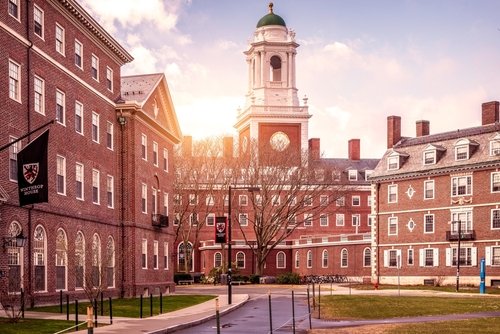By David Stephen —
Sedona, AZ –Harvard is supposed to be the wealthiest university on earth. However, Harvard was never firm enough to not need government funding.
[Reuters — November 20, 2025 — Harvard negotiations are ongoing, close to being finalized, Secretary of Education McMahon says]
Harvard University is horrifyingly needy, desperate and cheap to manipulate, their people would seek help from those they would not want to be associated with in public.
[The Boston Globe — November 18, 2025— Jeffrey Epstein helped broker a major gift for Larry Summers’ wife. She said it ‘changed everything’ for her at Harvard.]
In the last decade, Harvard University did not make any groundbreaking contributions to artificial intelligence research, in other to get ahead of it, towards safety and to steer it for humanity away from commercials interests.
[Cloudflare — What is the history of AI?]
Harvard University does not know what human intelligence is in the brain, the components, their mechanism and how to improve it, to outcompete AI. Harvard does not have a human intelligence research lab. Harvard has contributed nothing to the understanding of what exactly human intelligence is in the cranium.
[Harvard University Project Zero Intelligences]
So, what has Harvard been doing? The most advanced brain research at Harvard is so distant from answering mainstream questions about the brain that it may as well be forgone.
[The Harvard Gazette — May 9, 2024 — Researchers publish largest-ever dataset of neural connections]
“A cubic millimeter of brain tissue may not sound like much. But considering that that tiny square contains 57,000 cells, 230 millimeters of blood vessels, and 150 million synapses, all amounting to 1,400 terabytes of data, Harvard and Google researchers have just accomplished something stupendous.”
No, they didn’t.
Stupendous for who? Or, for what? For human intelligence, against mental disorders, addictions or neurodegeneration?
And stupendous when, this century or the next?
“The Harvard team helped create the largest 3D brain reconstruction to date, showing in vivid detail each cell and its web of connections in a piece of temporal cortex about half the size of a rice grain.”
If their success is “about half the size of a rice grain” when would they map the whole brain and explain?
[Given that “one cubic millimetre is one-millionth of a whole brain” — Scientific American.]
Harvard University does not have any credible theory on how the brain works. So, the next thing is to map the brain, to seek what useful thing — exactly among all the major brain problems — at this time?
On April 14, 2025, Harvard wrote The Promise of American Higher Education, saying “New frontiers beckon us with the prospect of life-changing advances—from treatments for diseases such as Alzheimer’s, Parkinson’s, and diabetes, to breakthroughs in artificial intelligence, quantum science and engineering, and numerous other areas of possibility.”
Harvard University is close to solving Alzheimer’s and Parkinson’s like a jetliner is about to touchdown on a runway on Mars, this weekend. Like why even mention those two, given that their best brain research, connectome [brain map] is at least a century away — to be modest?
Harvard’s greatest achievement is to keep the donations flowing. Nothing beats that high. And how have they used their economic might to help the world, in a way that can move the world, in general, forward?
Aside pockets of good they do, many negligible, Harvard and its buddies, are a net negative for the world, as per inequality. Harvard knows that getting through them confers an unfair benefit, where those, of them, get placed better than others or use their networks and so forth.
And they like it this way since they know that the ease they handout becomes a persuasive meld to have their people donate later. The fallout of the disadvantage is not theirs to care. The world, or some locations, in some instances, may have paid heavily for it.
What has Harvard done to solve economic inequality, at the employment level directly? Posting lecture videos online? Like what does it mean that Harvard is huge, and they are working constantly against the labor force imbalance?
When people were victims of the unfairness they faced because of competition against something Harvard, what did Harvard do?
But when their funding was cut in 2025, they became the victim, they started mentioning all their researches — many dysfunctional and aimless — like they were going to solve problems the next day. The farce too that they are ahead made them misled countless universities that imitated their errors. Harvard was in the lead, and a lot of things in the world are worse for it.
Still, say they can’t do much in labor economics, how about AI? As an institution — with the appeal they have and how they can gather their squad to withstand the disadvantages of tech, social media and AI — what have they done?
All the major problems about AI in the news in the last three years of this AI-century, what has Harvard solved for humanity, going in parallel, with dedication to answers as problems emerged in consumer AI, against the negligence of tech [with their own agenda]?
Nothing. Just keep the donations flowing. Harvard is a donations-principled organization. All their decisions rest on that goal, so their donors have them on a leash and they are remote from any useful breakthrough in science and technology.
The spark of Harvard has diminished and their future, they sold. The desperation that a high-profile faculty is begging a source [they won’t associate with in public] says a lot about how there is no core about the University, regardless of what remains shiny about them.
Now, AI can comfortably replace Harvard. Whatever Harvard can do that AI cannot, for now, can be found elsewhere for less or it is possible to just wait for AI’s next jump. The world that Harvard is a big deal no longer exists because of — the equal opportunity of — AI.
Harvard University is the example that everything can stay the same and look great, but they have fallen into disrepair, disrepute and irrevocably diseased.





